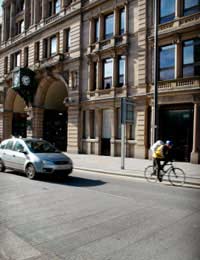Is Your Journey Necessary?

As a nation, we seem to have become obsessed with unnecessary journeys – at least ones involving our cars – with around a quarter of trips of less than two miles being made using them, according to the Department for Transport (DfT).
Over the last ten years, the official figures show that the number of journeys per person made on foot fell by 16 per cent and there are currently more households with two or more cars than car-less ones. Unless something changes, the DfT forecast for 2025 indicates a 40 per cent increase in car use – and that will mean twice as long spent sitting in traffic congestion. It is a distinctly gloomy prediction and one which offers nothing for the environment. Clearly something has to be done to turn the tide, but the funny thing about unnecessary journeys is that other people’s are always so much easier to spot – so how do you know if your journey is really necessary and what can we all do to make more of them redundant?
Some journeys are always going to be unnecessary in the literal sense, such as leisure and holiday travel, for instance – but unless we are about to abandon them wholesale, trying to pick and choose is always going to be fraught with difficulty. If we are serious about wanting to reduce our environmental impact, then we must leave it to our green conscience to make the call, as best as we can, in the knowledge that none of it can ever really be called “necessary.” However, there are other areas where the decision can be a little more clear cut.
Business Travel and the Daily Commute
Work offers unparalleled opportunity for unnecessary journeys and, as many companies are coming to realise, many face-to-face meetings can be adequately replaced by telephone or video conferencing. Using technology to span the miles rather than planes, trains and motor cars offers significant environmental benefits, of course, but also the added bonus of freeing up all that travelling time for more productive work. It would be wrong to suggest that all business travel can be made redundant in this way; there will always be some occasions when only a physical presence will do – and this will be more common in some industries than others. However, there is often scope to change the way we work and it is certainly worth considering cutting out journeys when it would be sensible to do so.The same idea can also be extended to working from home. UK workers spend an average of 92 minutes per day commuting, according to recent studies and yet, for many of us, the job we will do once we get there could be done just as well from our own homes. Arguably the greenest way to work, telecommuting is a great opportunity to reduce carbon footprints and avoid unnecessary travel on a daily basis. It has been estimated that even working from home for just one or two days a week could reduce the number of commuting cars on our roads by around 10 per cent.
Reducing Food Miles
According to the Centre for Alternative Technology, during the last decade, the distance travelled by our food has increased by 50 per cent, with some products being transported hundreds of miles to be packaged before going on sale. The modern trend of flying fresh food in from the far-flung corners of the globe also exacerbates the “food-miles” problem – as does our own contribution when we drive to out-of-town supermarkets to shop. So, given that we all must eat, what can we do to cut down on these unnecessary extra food-miles?While supermarkets, of course, have their role, even the most cursory glance at their shelves will tell a story of the distances travelled – the country of origin on many familiar foods, especially those available out of season, makes fascinating reading. Out of town retail parks are a facet of modern life, but even making a little effort to buy seasonal produce from local suppliers or find a farmers’ market can help avoid an unnecessary journey – and to steal one supermarket’s catchphrase, “every little helps.”
With something approaching 75 per cent of all UK journeys being short enough to make cycling a realistic option and with congestion predicted to almost double in our major towns and cities in the near future, viewing the car as the default option is fast becoming untenable. If things continue as forecasted, then it seems pretty inevitable that we will all have to begin to examine the real need for our own particular trips very carefully. In the end, perhaps the best way to answer whether or not your journey is necessary is to sidestep it altogether; after all, if you plan to walk or cycle, the question really does not apply!


Re: An Eco Travelling Fact Sheet
Kak esehiko sminor k112 ecotravelling.co.uk
Re: An Eco Travelling Fact Sheet
Hello,My name is Cliff Barre and my wife Tiffany and I are responsible green tourists and active writers for our Peace, Love, and…
Re: Buses Fuelled by Waste
Thanks for that, this website is really good, it really helped me out with my science project at school. :-)
Re: Eco-Friendly Holidays
My Family has been taking eco-immersion trips the past three years, and have really found a great way to save money, and be immersed in the…
Re: Ethical Tourism
This was simply marvelous. I enjoyed it thoroughly. I'll remember this next time I am visiting the people of Burma.